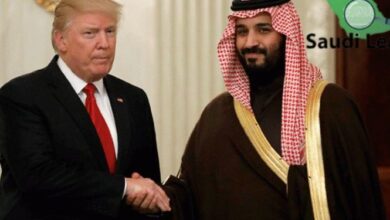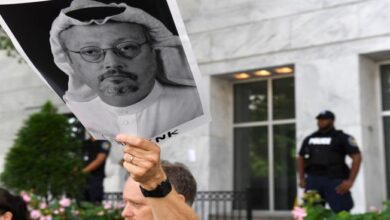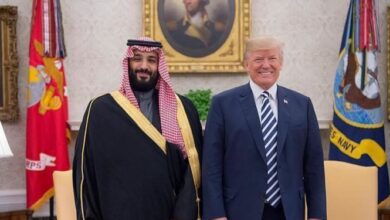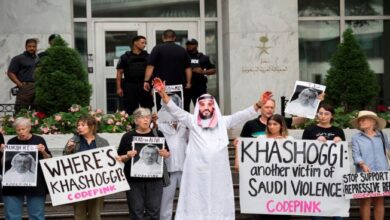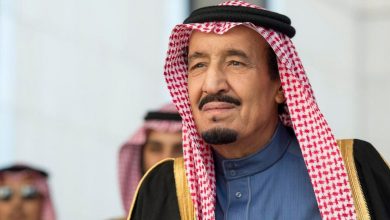Newly Declassified U.S. Report Holds Saudi Crown Prince Responsible for Khashoggi Killing
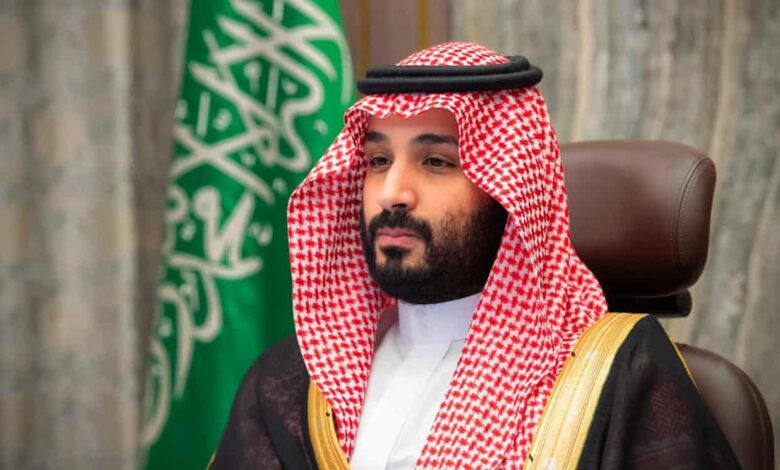
Crown Prince Mohammed bin Salman of Saudi Arabia approved the plan for operatives to assassinate the journalist Jamal Khashoggi in 2018, according to a previously classified intelligence report released on Friday by the Biden administration.
Much of the evidence the C.I.A. used to draw that conclusion remains classified, including recordings of Mr. Khashoggi’s killing and dismemberment at the Saudi consulate in Istanbul that were obtained by Turkish intelligence. But the report does outline who carried out the killing, describe what Prince Mohammed knew about the operation and lay out how the C.I.A. concluded that he ordered it and bears responsibility for Mr. Khashoggi’s death.
The release of the report also signaled that President Biden, unlike his predecessor, would not set aside the killing of Mr. Khashoggi and that his administration intended to attempt to isolate the crown prince, although it will avoid any measures that would threaten ties to the kingdom. Administration officials said their goal was a recalibration, not a rupture, of the relationship.
The Report on Jamal Khashoggi’s Killing
The Biden administration released a report on the killing of the journalist Jamal Khashoggi, a sign the new president will try to isolate Crown Prince Mohammed bin Salman of Saudi Arabia, who American intelligence agencies concluded approved the planned assassination.
The report’s disclosure was the first time the U.S. intelligence community has made its conclusions public, and the declassified document is a powerful rebuke of Prince Mohammed, the de factor ruler of Saudi Arabia and a close ally of the Trump administration, whose continued support of him after Mr. Khashoggi’s killing prompted international outrage.
“We assess that Saudi Arabia’s Crown Prince Mohammed bin Salman approved an operation in Istanbul, Turkey to capture or kill Saudi journalist Jamal Khashoggi,” said the report, issued by Mr. Biden’s director of national intelligence, Avril D. Haines.
The four-page report contained few previously undisclosed major facts. It reiterated the C.I.A.’s conclusion from the fall of 2018 that Prince Mohammed ordered the killing of Mr. Khashoggi, a Washington Post columnist and legal permanent resident of Virginia who was critical of the Saudi government. The report was written a year ago after Congress, which had been briefed on the underlying findings, passed a law mandating intelligence agencies’ conclusions be declassified and released.
But the declassified report still has the power to shock given the brutality of the assassination. Saudi officials lured Mr. Khashoggi to the consulate, where they killed him and were said to use a bone saw to dismember his body.
Prince Mohammed viewed Mr. Khashoggi as a threat and “broadly supported using violent measures if necessary to silence him,” the intelligence report concluded. American intelligence agencies learned that Saudi officials had planned an unspecified operation against Mr. Khashoggi, but the report said the United States has not learned when Saudi officials decided to harm him.
No single piece of evidence outlined in the report points to Prince Mohammed’s guilt. Instead, intelligence officials have long said, smaller pieces of evidence, combined with the C.I.A.’s understanding of the prince’s control of the kingdom, led them to a high confidence conclusion of his culpability.
According to the report, Prince Mohammed “fostered an environment” where his aides feared that any failure to follow his orders could result in their arrest. “This suggests that the aides were unlikely to question Mohammed bin Salman’s orders or undertake sensitive actions without his consent,” the report said.
In addition to outlining Prince Mohammed’s culpability, the report lists 21 others involved in the killing of Mr. Khashoggi.
They included members of a hit team that had flown from Saudi Arabia to Turkey, where they killed and dismembered him on Oct. 2, 2018, after Saudi officials lured Mr. Khashoggi, who was seeking paperwork to marry his Turkish fiancée, into the kingdom’s consulate in Istanbul. His body was never found.
The hit team worked for the Saudi Center for Studies and Media Affairs, at the time lead by Saud al-Qahtani, a close adviser of the prince. The report noted that Mr. Qahtani had said publicly that he did not make decisions without Prince Mohammed’s approval.
Even before the hit team — called the Saudi Rapid Intervention Force in the report — killed Mr. Khashoggi, Prince Mohammed authorized a secret campaign to silence dissenters.
Seven members of the that unit were on the 15-person team sent after Mr. Khashoggi in Istanbul, according to the report. The involvement of the unit was a key piece of evidence implicating Prince Mohammed, the report said.
The unit, according to the report, “exists to defend the crown prince, answers only to him, and had directly participated in earlier dissident suppression operations” at the direction of Prince Mohammed. “We judge that members of the RIF would not have participated in the operation against Khashoggi without Muhammad bin Salman’s approval,” the report said.
The administration announced broad sanctions against the unit. While previous administrations have taken steps against units of partner states involved in human rights abuses, it is unusual to take that step against close partner nation like Saudi Arabia.
Under human rights law known as the Leahy amendments, the United States has banned military units from both Pakistan and Indonesia from receiving American aid because of records of abuse.
Representative Adam B. Schiff, Democrat of California and the chairman of the House Intelligence Committee, said “there is no escaping that stark truth” in the intelligence community’s assessment. “This report underscores why Saudi Crown Prince Mohammed bin Salman’s repeated claims that he was either unknowing or uninvolved in this heinous crime are in no way credible,” he said.
Ahead of the report’s release, Mr. Biden spoke to King Salman of Saudi Arabia. Although the official White House description of the call did not say that the two men discussed the report, other officials said the purpose of the discussion was for Mr. Biden to explain why he was releasing the findings and outline the administration’s next steps. The administration has made clear that Mr. Biden will speak only to King Salman, his counterpart as head of state, and will not speak directly to the crown prince.
Whether the new administration’s attempt to bypass the 35-year-old crown prince and deal only with his 84-year-old and often ailing father will succeed remains to be seen. Senior administration officials said while Prince Mohammed is not welcome in the United States, they will not be able to cut off all discussions between him and the administration.
Mr. Biden campaigned on a pledge to hold Saudi Arabia to account for human rights abuses. And the Biden administration has already taken a more cautious approach to the Saudi government, limiting arm sales and cutting off any support for the kingdom’s war in Yemen.
Senator Mark Warner, the Virginia Democrat who leads the Senate Intelligence Committee, said the United States had previously failed to hold Saudi Arabia accountable. “I’m encouraged to see the new administration taking steps to rectify that by releasing this long-overdue congressionally mandated report into his killing,” Mr. Warner said.
The Trail of Clues in the Disappearance of Jamal Khashoggi
Hatice Cengiz, Mr. Khashoggi’s fiancée, has sued Prince Mohammed and other Saudi officials in American courts under the Torture Victim Protection Act of 1991.
Turkish intelligence made a tape of Mr. Khashoggi’s interrogation and killing, which they played for Gina Haspel, then the C.I.A. director. Not long after, the agency told lawmakers that it had concluded Prince Mohammed was culpable in the killing.
Because the recording was collected by Turkey, an allied country, it was not within the power of the C.I.A. to declassify a transcript of the recording, at least not without the blessing of Ankara, current and former officials said.
The report was not expected to officially confirm other details of the murder, such as the hit team’s use of a bone saw, the assassins’ request that a message be passed to Prince Mohammed that their mission was complete or the crown prince’s earlier threats to use a bullet to silence Mr. Khashoggi.
Such details are part of the mosaic of facts that led the C.I.A. to conclude Prince Mohammed gave the order to kill Mr. Khashoggi. But the entire set of facts the C.I.A. used to draw its conclusion remains classified to protect the agency’s sources of information and methods of collecting secrets in the kingdom, according to American officials.
After Mr. Khashoggi’s killing became public, Saudi officials sought to deflect blame from the crown prince. The Saudi government imprisoned eight people in connection with Mr. Khashoggi’s death, trying them largely secretively. Although five were originally sentenced to death, after one of Mr. Khashoggi’s sons said he and his siblings had forgiven the men who killed their father, a Saudi court reduced the sentences to prison terms.
In November 2018, President Donald J. Trump released an exclamation-filled statement, which was at once dissembling and candid. Aiming to move past Mr. Khashoggi’s killing and continue his close relationship with the Saudi government, Mr. Trump talked about the importance of arms sales and the threat of Iran and said Prince Mohammed’s involvement was uncertain. “Our intelligence agencies continue to assess all information,” Mr. Trump wrote, “but it could very well be that the Crown Prince had knowledge of this tragic event — maybe he did and maybe he didn’t!”
The statement was misleading, at best. While the C.I.A. was continuing to collect information, as early as mid-October 2018, agency officials had determined Prince Mohammed was culpable. And the following month, the agency told Congress that it was confident he gave the order to kill Mr. Khashoggi, the conclusion the newly released report reinforces more than two years later.
The release of the report was long in coming.
In 2019, Congress passed a measure requiring the executive branch to give lawmakers an unclassified report about Mr. Khashoggi’s death and the intelligence community’s conclusions. The Trump administration never complied.
But during the confirmation hearing last month for Avril D. Haines to become director of national intelligence, Senator Ron Wyden, Democrat of Oregon, asked whether she would turn over the unclassified report.
“I absolutely will follow the law,” Ms. Haines replied.

